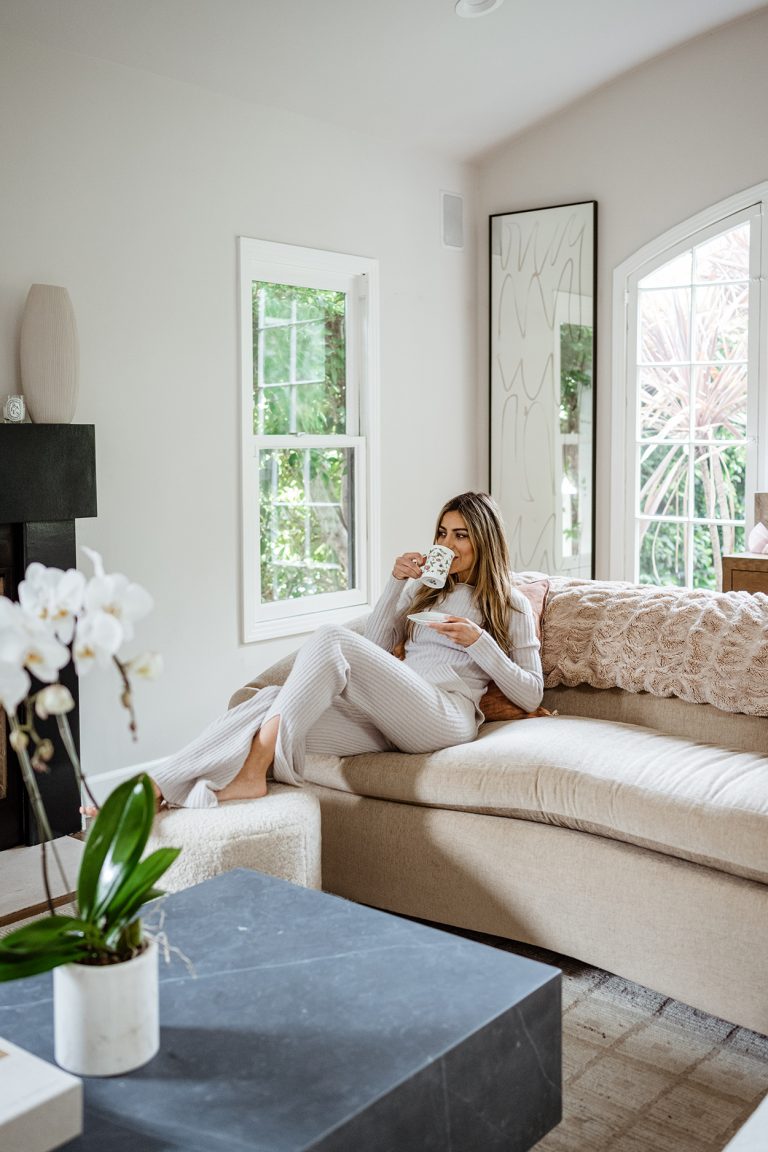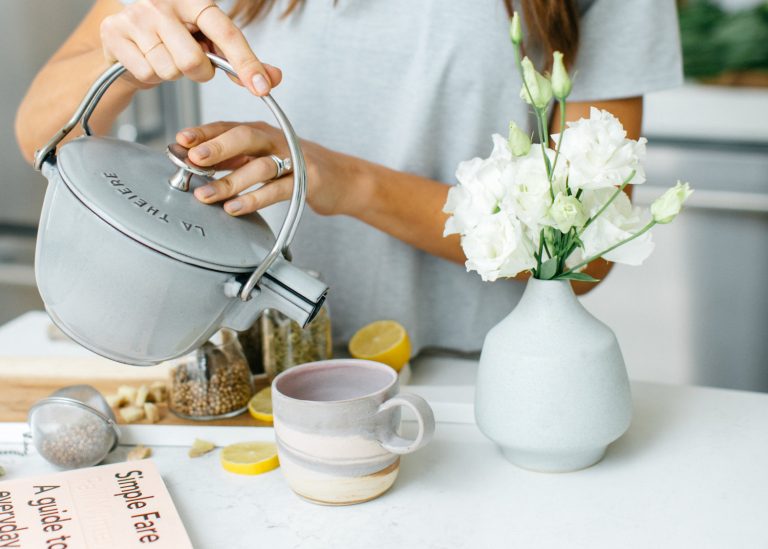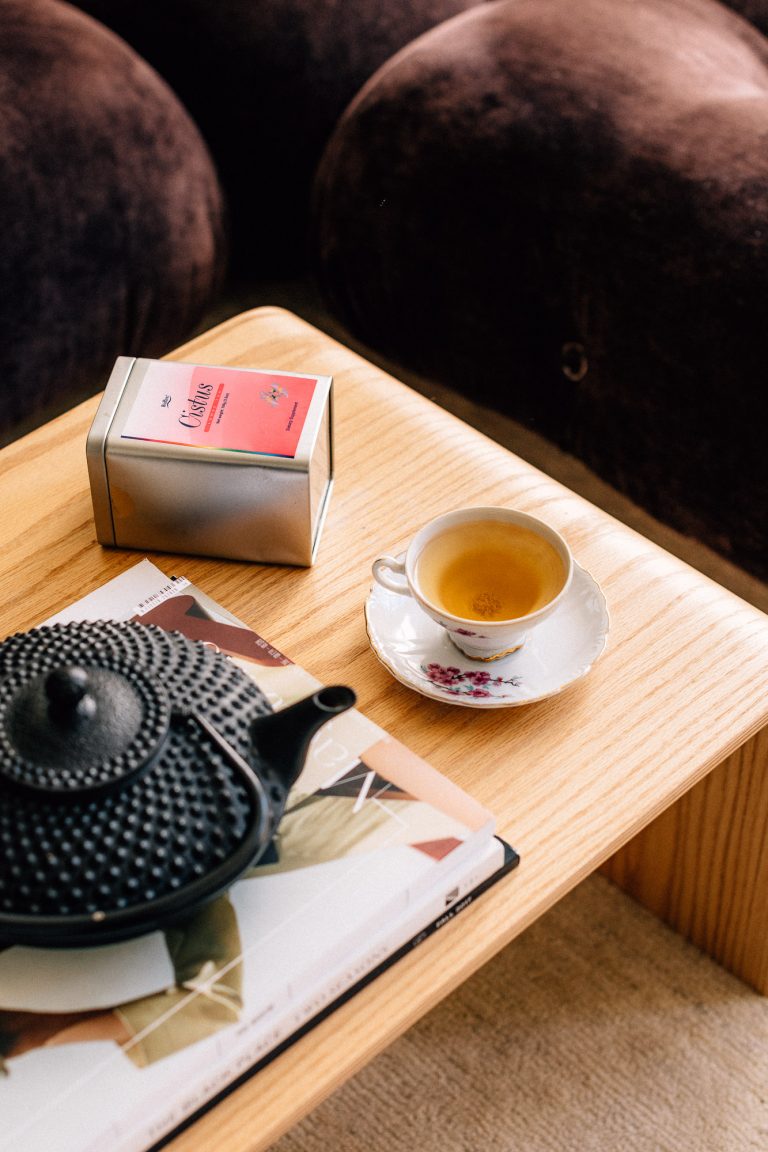Need to Lower Your Cortisol? A Nutritionist Shares the 10 Best Teas for Stress Relief
Sift through the tea box at your favorite spa, and you’re bound to find teas like chamomile, lemon balm, rose, and peppermint. No surprise, as these herbal teas are one of life’s most simple and soothing pleasures. Creating a ritual out of steeping tea is comforting, relaxing, and instantly grounding. Despite their modern-day wellness allure, calming teas are nothing new. For centuries, communities across the globe have celebrated the relaxing and tranquil qualities of tea. Tea is central in family gatherings, entertaining guests, and formal ceremonies. Ready to unwind? Read on to get your steep on. These are the best teas for stress relief.
Herbal Tea Isn’t Technically Tea
Hear me out! Believe it or not, all tea comes from the same plant. From oolong to black tea or green tea, all caffeinated varieties hail from the Camellia sinensis plant. There are two main kinds: The Camellia sinensis sinensis and Camellia sinensis assamica. The former grows in China, Vietnam, Korea, and Japan. The latter grows more frequently in India, Sri Lanka, and Kenya. A small evergreen shrub or tree, the Camellia sinensis—also known as the ‘tea plant’—is what eventually becomes your piping hot cup of infused water.
What this means for herbal teas: They don’t stem from the Camellia sinensis. Instead, they’re typically a blend of spices, leaves, roots, dried flowers, fruit, bark, etc. Herbal teas are delicious, complex, and healing. There’s an expanse of flavors and options. However, they don’t technically come from the tea plant itself.
So, What Is Herbal Tea?
Herbal tea is a beverage made from an infusion or decoction. A decoction is a method of extraction. Think boiling herbal or plant material. These infusions contain herbs, spices, or other plant materials. The more the merrier: Dried herbs, fruits, seeds, and roots are fair game. Steeped together, they make up deeply complex flavors and hues. Some herbal blends contain actual tea, although those aren’t as common. Varieties include ginger, ginseng, hibiscus, jasmine, rose hip, mint, rooibos (red tea), chamomile, and echinacea. Depending on the plant(s) used, they all have varying chemical compositions. You’ll find many of these ingredients in the best teas for stress relief.

Using Medicinal Herbs for Traditional Healthcare Needs
Throughout history—particularly in Eastern medicine—herbal teas have been applied therapeutically. They’ve always been an important component of traditional medicine. Centuries later, the evidence speaks for itself. Research confirms they contain antimicrobial, anti-inflammatory, and antioxidant properties. If you’ve ever tasted a vibrant pink hibiscus tea (hot or iced!), you can practically feel its powerful antioxidants running through your veins. In many ways, it’s no longer folklore that herbal teas can provide a variety of health benefits. In fact, studies show that 60-80% of the world’s population depend on medicinal herbs for their healthcare needs. As always, speak with your healthcare provider before implementing a new supplement or herbal infusion routine.
Benefits of Herbal Tea
More than just a wellness trend, herbal teas have been studied for their ability to boost immunity, energy, mitigate stress, and aid in sleep. Studies are ongoing, of course, but according to the U.S. Department of Agriculture, we already know the following: Chamomile tea has “moderate antimicrobial activity,” peppermint tea “has been found to have significant antimicrobial and antiviral activities, strong antioxidant and anti-tumor actions, and some antiallergenic potential,” and based on a human clinical trial, drinking hibiscus tea “lowered blood pressure in a group of pre-hypertensive adults.”

6 Herbs to Drink for Relaxation
While some brews provide more health advantages than others, there’s plenty of evidence to support drinking tea, regularly. Just be mindful of additives, like refined sugar. However, if you want more bang for your buck, take a look at these nutritious ways to upgrade your afternoon cup. They may have a lasting impact on your wellness.
Peppermint
Peppermint tea contains menthol, which is a naturally occurring muscle relaxant. Mint tea can help encourage full-body relaxation after a stressful day.
Rose
Rose petals can be added to many different kinds of tea, and impart a floral, slightly sweet flavor to whatever tea they mix with. Rose helps to reduce stress and anxiety and promotes calm and relaxation. While roses that are grown specifically for consumption often have a more concentrated flavor and beneficial properties, even traditional garden roses may have similar effects when dried and infused in water.
Lavender
Like the rose, lavender is another common floral addition to teas. Lavender has been shown to have a positive effect on anxiety disorders by promoting healthy sleep patterns and relaxation. Lavender can be found in a wide range of different teas, from floral black teas to specially concocted “sleepy time” blends.
Chamomile
Chamomile tea is another popular tea, known for its ability to soothe and calm. A study at the University of Pennsylvania found it could help in treating generalized anxiety disorder. It’s also a popular sleep aid—the perfect bedtime tea.
Lemon Balm
Lemon balm tea works to reduce the stress hormone cortisol and doesn’t cause drowsiness. It can also boost alertness and concentration. Of all herbal varieties, it’s a great choice if you need to reset (without caffeine) halfway through the day.
Passionflower
Passionflower tea contains the flavone chrysin, which aids against anxiety. It may help you sleep more peacefully.

Why Drink Tea for Stress Relief?
Beyond what’s actually in your kettle, the elaborate ritual of brewing tea is stress-relieving. It requires intention, focus, and meditation. The simple act of making (and sipping) a cup of tea can be both introspective and clarifying—a welcome interlude on an otherwise stressful day. Whether you brew a pot in the morning to set intentions at the beginning of the day or prepare a soothing cup to unwind before bed, preparing and drinking tea is self-care. Herbal tea is an oasis of calm and clarity.
The 10 Best Teas for Stress Relief
Look no further than the best teas for stress relief. Some subtle, some potent, they’re all comforting and delicious.
